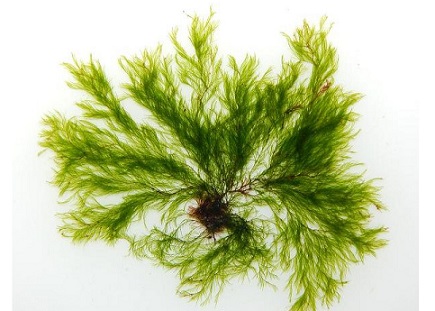Breakthrough in Anti-Herpes Treatment! Thailand Medical Researchers at Chiang Mai University Discover Potent Algae Extract
Kittisak Meepoon Fact checked by:Thailand Medical News Team May 27, 2024 10 months, 2 weeks, 4 days, 21 hours, 39 minutes ago
Thailand Medical - A New Hope for Herpes Treatment
A groundbreaking discovery from Chiang Mai University promises to revolutionize the treatment of herpes simplex virus (HSV) infections. The
Thailand Medical researchers have identified that polysaccharide extracts from the Cladophora algae exhibit powerful inhibitory effects against HSV-1 and HSV-2, offering a new, natural weapon against these pervasive and often debilitating viruses.
 Breakthrough in Anti-Herpes Treatment - Thailand Medical
Breakthrough in Anti-Herpes Treatment - Thailand Medical
Researchers at Chiang Mai University Discover Potent Algae Extract
The research team comprised of Pitchayuth Srisai, Sureeporn Suriyaprom, Aussara Panya, Jeeraporn Pekkoh & Yingmanee Tragoolpua.... all from the Department of Biology, Faculty of Science, Chiang Mai University-Thailand.
The Herpes Virus: An Overview
Herpes simplex virus (HSV) is a major public health challenge worldwide. HSV-1 typically causes oral herpes, presenting as cold sores, while HSV-2 is primarily responsible for genital herpes. Both strains are highly contagious and incurable, often resulting in recurrent outbreaks and significant discomfort for those affected.
Traditional treatments for HSV, such as acyclovir and its derivatives, target the viral DNA polymerase. While effective, these drugs can lead to side effects and the development of drug-resistant viral strains. This underscores the urgent need for new therapeutic strategies, particularly those derived from natural sources.
Algae: A Natural Treasure Trove
Edible algae have long been celebrated for their nutritional benefits. Recent research has also highlighted their potential as sources of bioactive compounds with various health benefits, including antiviral properties. In this context, the polysaccharide extracts from Cladophora spp., a type of green algae, have emerged as a particularly promising candidate for HSV treatment.
Chemical Composition and Structure
The research team at Chiang Mai University conducted an in-depth analysis of the polysaccharide extracts from Cladophora spp. Using Fourier-transform infrared (FT-IR) spectroscopy, they identified key structural components, including sulfate groups that are known to confer antiviral properties. The extracts were rich in carbohydrates (51.37%) and contained significant amounts of protein (13.69%) and sulfate (7.31%).
Low Toxicity and High Efficacy
The toxicity of the algal extract was assessed using an MTT assay on Vero cells, a standard cell line for viral research. The results were promising, showing low toxicity with a 50% cytotoxic concentration (CC50) value greater than 5000 µg/mL. This indicates that the extracts are safe for use at concentrations that are effective against HSV.
Antiviral Activity: Plaque Reduction Assay
The antiviral activity of the algal extract was evaluated using a plaque reduction assay. This method measures
the ability of a substance to reduce the number of viral plaques, which are clear zones caused by virus-induced cell death. The extracts demonstrated potent antiviral effects against both HSV-1 and HSV-2.
For HSV-1, the 50% effective concentration (EC50) values were 70.31 µg/mL (before viral adsorption), 15.17 µg/mL (during adsorption), and 9.78 µg/mL (after adsorption without removal of the extract).
For HSV-2, the EC50 values were 5.85 µg/mL (before adsorption), 2.57 µg/mL (during adsorption), and 26.96 µg/mL (after adsorption without removal).
These values indicate strong antiviral activity, particularly during and after the viral adsorption phase.
Mechanisms of Action: Direct Inactivation and Replication Inhibition
The extracts not only prevented the virus from infecting cells but also directly inactivated viral particles. When treated with the algal extract, HSV-1 and HSV-2 virions showed a significant reduction in infectivity, demonstrating that the extract could disrupt the viral life cycle at multiple stages.
Impact on Viral Replication
The study also revealed that the extracts inhibited HSV replication. This was evidenced by a substantial reduction in viral yield when infected cells were treated with the extract. This dual action - both preventing infection and inhibiting replication - makes the Cladophora polysaccharide extract a highly effective anti-HSV agent.
Comparative Efficacy: Algae vs. Traditional Treatments
While traditional antiviral drugs remain a critical component of HSV treatment, the potential side effects and the emergence of drug-resistant strains highlight the need for alternative therapies. The algal polysaccharide extract from Cladophora spp. offers several advantages:
-Natural Origin: Being a natural product, it is less likely to cause severe side effects compared to synthetic drugs.
-Broad Spectrum: The extract's ability to inhibit multiple stages of the viral life cycle reduces the likelihood of resistance development.
-Low Toxicity: High safety margins make it suitable for long-term use.
Future Directions: From Lab to Clinic
The promising results of this study pave the way for further research and development. Future studies will focus on refining the extraction and purification processes to enhance the efficacy and safety of the polysaccharide extracts. Clinical trials will be essential to confirm these findings in human subjects and to establish optimal dosing regimens.
Conclusion: A New Dawn in HSV Treatment
The discovery of the antiviral properties of Cladophora algae polysaccharides marks a significant advancement in the fight against HSV. This natural, low-toxicity treatment has the potential to provide relief for millions of people affected by herpes simplex virus infections. With continued research and development, these algae-derived compounds could become a cornerstone of future antiviral therapies, offering a safer and more effective alternative to traditional drugs.
Thailand Medical researchers at Chiang Mai University have opened a new chapter in the search for natural antiviral agents, highlighting the untapped potential of marine resources in addressing global health challenges.
The study findings were published in the peer reviewed journal: Scientific Reports (Springer Link).
https://link.springer.com/article/10.1038/s41598-024-60941-7
For the latest on Herpes, keep on logging to
Thailand Medical News.
Read Also:
https://www.thailandmedical.news/news/herbs-and-phytochemicals-geraniin-from-elaeocarpus-sylvestris-inhibits-herpes-simplex-virus-1
https://www.thailandmedical.news/news/study-uncovers-how-human-astrocytes-fight-off-herpes-simplex-virus
https://www.thailandmedical.news/news/herbs-and-phytochemicals-polysaccharide-extracts-of-prunella-vulgaris-inhibits-herpes-simplex-virus-infection-by-blocking-tlr-mediated-nf-kb-activatio
https://www.thailandmedical.news/news/herbs-and-phytochemicals-polysaccharide-extracts-of-prunella-vulgaris-inhibits-herpes-simplex-virus-infection-by-blocking-tlr-mediated-nf-kb-activatio
https://www.thailandmedical.news/news/researchers-unravel-how-herpes-virus-can-remain-dormant-and-reactivate
https://www.thailandmedical.news/news/researchers-discover-inflammatory-protein-that-can-stop-herpes-virus-spread-
